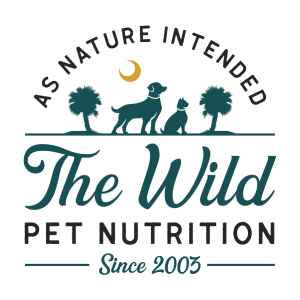The FDA, Grain Free Foods, and Dilated Cardiomyopathy

The Wild endeavors to keep you updated as to this situation as we are closely monitoring the latest information. On June 27th, 2019, the FDA released an updated statement (1) on the “Investigation into Potential Link between Certain Diets and Canine Dilated Cardiomyopathy,” also known as DCM. Misleading media headlines continue to perpetuate fear and misunderstanding about this issue while the the most obvious and pertinent pieces of data are being overlooked almost entirely.
What is DCM?
Dilated cardiomyopathy is a condition affecting the heart muscle in which parts of the heart become weakened and enlarged, potentially leading to congestive heart failure. Some breeds of dogs are known to be genetically predisposed to the development of this condition and that is in no way linked to diet.
The cases that the FDA is currently investigating involve dogs who are not known to be genetically predisposed. In some of these cases, the dogs have also been found to have very low levels of taurine in their blood work. Taurine deficiency is known to be a cause of DCM in both dogs and cats.
What is taurine?
Taurine is an amino acid which dogs have the ability to naturally synthesize through the amino acid precursors cysteine and methionine. All three of these amino acids are plentiful in fresh meat, the fundamental dietary requirement of any carnivorous animal (like dogs and cats).
What is the FDA saying about this issue?
The FDA’s updated statement lists the dog food brands that have been consumed by the pets in these reported cases in their order of prevalence. Despite having released this information, the FDA has issued NO recalls of any foods believed to be related to this issue and it does not promote any specific dietary changes as a result of this limited information.
On the FDA’s Question and Answer page, in response to question 16, “Do I need to change my dog’s diet?” it states, “At this time, we are not advising dietary changes based solely on the information we have gathered so far” (emphasis added, 2). In question 17, “What’s the safest diet for my dog?” it goes on to say, “It’s important to note that the reports include dogs that have eaten grain-free and grain containing foods and also include vegetarian or vegan formulations. They also include all forms of diets: kibble, canned, raw and home-cooked. Therefore, we do not think these cases can be explained simply by whether or not they contain grains, or by brand or manufacturer” (emphasis added, 2).
Neither the FDA, nor veterinarians, nor researchers know the actual cause of these cases of DCM. Some veterinarian researchers are speculating that it relates to the legumes (peas, lentils, beans) and potatoes that are used as binding starches in grain-free diets in place of grains. However, this is not only unproven, but DCM has occurred among pets eating grained diets as well.
What does the new data really reveal?
Despite the amount of sensationalized attention this issue has received, the reported occurrences of dilated cardiomyopathy are still extremely rare. As the FDA states on their question and answer page in point 17, “To put this issue into proper context, the American Veterinary Medical Association estimates that there are 77 million pet dogs in the United States. As of April 30, 2019, the FDA has received reports about 560 dogs diagnosed with DCM suspected to be linked to diet. Tens of millions of dogs have been eating dog food without developing DCM.” (2)
While it is certainly an issue to be addressed, many folks are ignoring some of the most pertinent data. The single most striking detail of this report is the type of food consumed by these pets. The FDA’s updated statement contains an important graph that shows far more than brands of food. In this graph, entitled “Dog Food Formulations in DCM Reports to FDA,” it reveals that in 452 (out of 515) of the reported cases of DCM, the dogs were eating an exclusively dry food diet. A wide variety of diets have been consumed by the pets in these very few reported cases of DCM, including both grained and grain-free varieties, but what appears most consistent is a long term consumption of exclusively dry, processed pet food.
What do you recommend to protect my pet and prevent diet-related DCM?
Here at The Wild, we continue to make the same feeding recommendation we always have: Give your pets the best and highest quality foods you can with as much animal-based protein as possible. Dry foods require starches to hold them together when they are baked, like flour in a cake, and the plant-based proteins in these starches do not provide the nutrients dogs and cats need for optimal health.
The highest quality and most bio-available source of taurine is fresh meat. Cooking will naturally deplete many of the nutrients in a food and this includes a reduction of taurine in cooked meats. A complete and balanced diet that includes fresh, raw meat and little to no starches is the most species-appropriate food you can offer your pet. Whether this means switching to a complete and balanced raw food diet, supplementing your dog’s diet with these foods, or working freeze dried raw food mixers into a high-protein kibble, the more meat and less starch you include in your pet’s diet the better.
In addition to a range of grain free and grained dry foods, we offer complete and balanced raw food diets from four different manufacturers: Stella & Chewy’s, Primal Pet Foods, Steve’s Real Raw Food, and Answers Pet Food, all of which provide a high quality and bio-available source of taurine, and other vital nutrients, to your pet. We specialize in a huge selection of freeze dried treats, patties and meal mixers, all of which are great ways to supplement your pet’s diet with those valuable nutrients.
As Dr. Karen Becker, DVM warns, “Unfortunately, some processed pet food advocates are using the link between grain-free dog foods and DCM to try to push pet parents back in the direction of grain-based diets. Don’t be fooled. The problem with grain-free formulas isn’t the lack of grains! It’s the high level of starchy carbohydrates coupled with the extreme high-heat processing methods used to produce these diets.” (3)
References
- https://www.fda.gov/animal-veterinary/news-events/fda-investigation-potential-link-between-certain-diets-and-canine-dilated-cardiomyopathy?fbclid=IwAR3LTxIdTFAvYmAnNxqOwH_7q8AI_097DpLVYNLTt4M3n18rZ5bkoiQxzyc
- https://www.fda.gov/animal-veterinary/animal-health-literacy/questions-answers-fda-center-veterinary-medicines-investigation-possible-connection-between-diet-and
- https://healthypets.mercola.com/sites/healthypets/archive/2018/09/19/food-related-heart-disease-in-dogs.aspx


